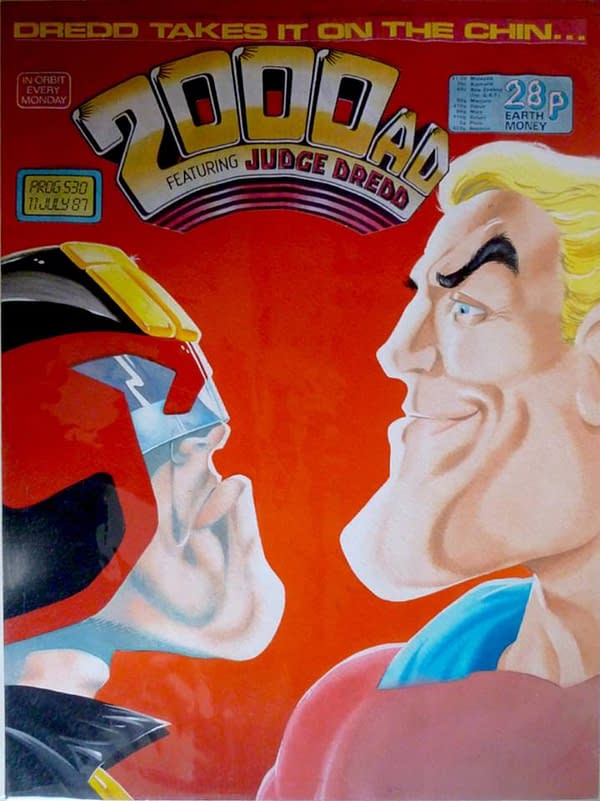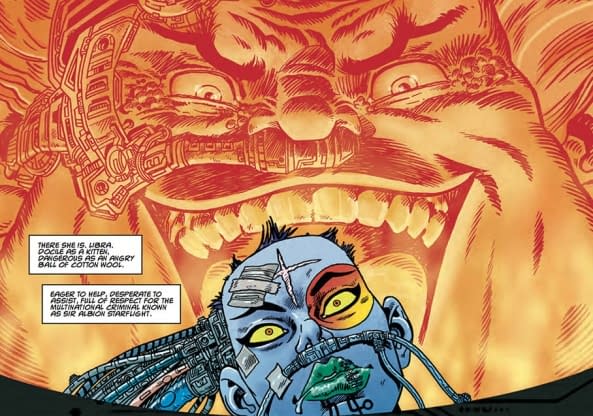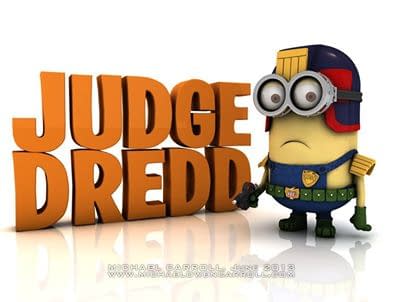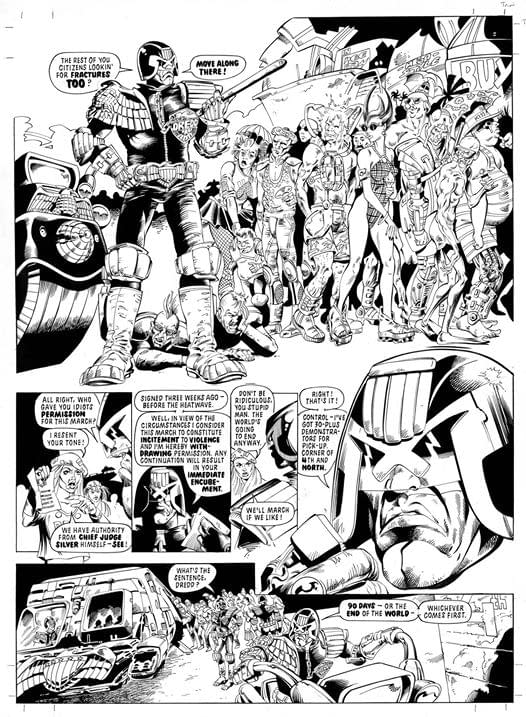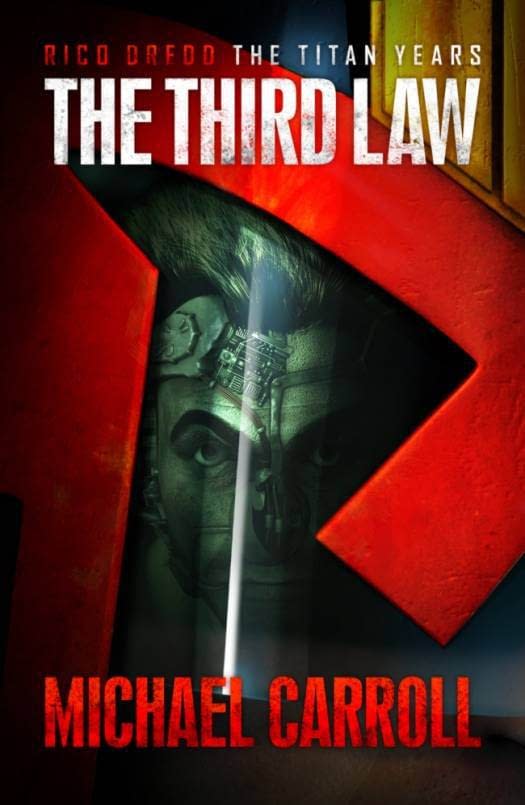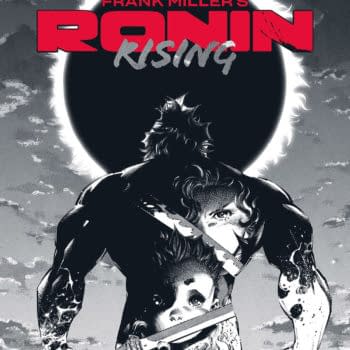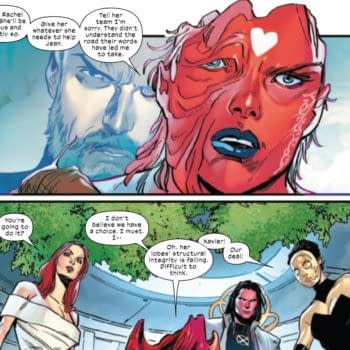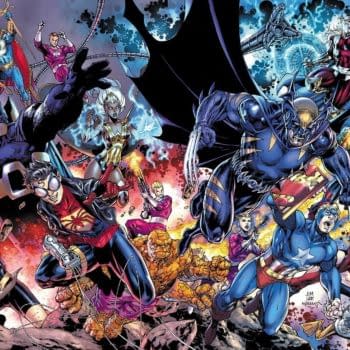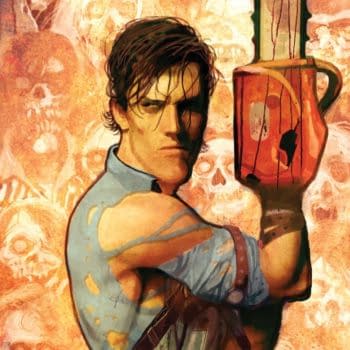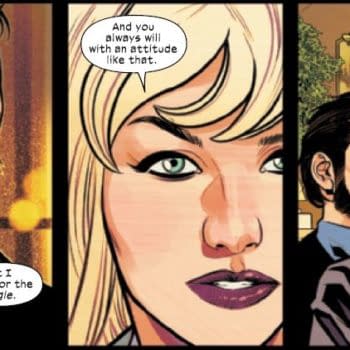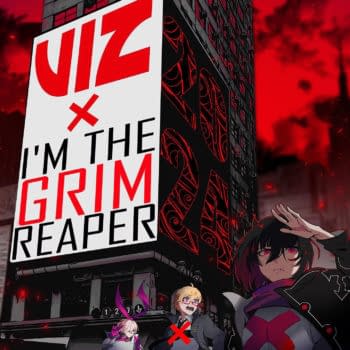Posted in: Comics | Tagged:
One Last Cheer! A 2000AD Birthday Interview With Mike Carroll, Mike Collins And Rufus Dayglo
With today being the official date, 40 years ago, that 2000AD actually dropped on shelves across the known universe for the very first time, it seemed sensible to round off a week of celebrations here at BC HQ with a catch up with some of the writers and artists that have made 2000AD the galaxy's greatest comic. So, we sent our own, somewhat defective but well-oiled, interviewing droid, Olly MacNamee, along to catch up with writer Mike Carroll (Judge Dredd: Every Empire Falls) and artists Mike Collins (Judge Dredd, Dr Who) and Rufus Dayglo (Bad Company, Counterfeit Girl) to discuss their own relationships with 2000AD over the years, as both readers and creators. Here's what they had to say.
Olly MacNamee: What were your earliest memories of 2000AD, either as a fan or as a creator? What was it like at the time you all started drinking from Tharg's special mix of Kool-aid?
Mike Collins: I really didn't 'get' 2000AD. I was a big Marvel guy, deep into my superhero stuff. Other kids in school were enthusiastic — a punk comic! But me? Nah, it looked crude compared to the glories of Neal Adams, Frank Brunner and Jim Starlin. AND it was mostly in black and white! Also, what was with the ziggy lines on Judge Dredd's visor? Were they actually mean to look like that? A few friends tried to convince me I was wrong– oddly, it was an Ian Gibson strip that got to me: Ian had used zipatone on Dredd's visor which gave it an American feel, I still thought the whole set-up was just a flash in the pan, an angrier version of the usual British boys comics, that I'd long felt I'd grown out of (16 year olds, eh?).
It actually took Starlord to make me a believer – here was a handsome package of strips on lovely paper, with staggeringly beautiful art by Carlos Ezquerra on a strip that played to all my interests in one Sci-fi! Westerns! Bounty hunters! I had a flavour that I'd not seen before but immediately understood. And what a fabulous title – Strontium Dog – evocative, strange and compelling.
When inevitably the paper folded into 2000AD I reluctantly went with it. Within a few issues I was sold, totally. The humour of Dredd, the strangeness of the various worlds Tharg ruled over- they captured me. I got it. And have stayed with it ever since.
Rufus Dayglo: When Star Wars came out, my father bought me 2000AD and it was Ramon Sola's fantastic dinosaurs in FLESH that caught my eye! Only later did I get into Judge Dredd.
It was perfectly pitched for little kids… M.A.C.H. 1 (6 Million Dollar Man), FLESH (dinosaurs…eating cowboys!!!), Judge Dredd (he has a cool bike, and a bucket on his head! AND Dan Dare (My dad complained that they had drawn him wrong, ha,ha)!
Straight away I was hooked and I happily got to draw Ol' One Eye in the 40th anniversary Prog!!! So it has come full circle for me!
Mike Carroll: My earliest memory of 2000AD is – I think – the four-page preview spread that appeared in some of the other IPC titles of the time, probably Action. I was already a big science fiction fan so 2000AD looked like it was going to be right up my street. I also remember a newspaper feature that previewed the comic and focussed on the reinvented Dan Dare: my dad remembered Dare from the original Eagle, and told me all about him. The new Dare was a lot different, but I loved it – as well as everything else in that first prog!
I also have very strong memories of the ad that ran on TV: that was impressive! The only other ad for a comic that I can recall (aside from the countless ads for Look-In, but that's different because it was published by ITV so I expect they got a discount on air-time) was for the first issue of Spider-Man Comics Weekly.
Actually, speaking of the 2000AD television ad … Some years back the only version of that to be found had been digitised from one of those "I Love the 1970s" shows. It was not a good copy: lots of interference lines and such. Well, I downloaded it, extracted every single frame as a separate image, cleaned them up, reassembled the whole thing and put it back on line. So the clean and shiny version now floating around is all thanks to me! (OM: I hope you've all now clicked on the embedded link to check it out for yourselves. Thanks, Mike!)
OM: We're so used to comics being relaunched continuously. But, 2000AD wears its heritage proudly. What were some of the stand out strip for you as a reader?
Rufus Dayglo: I think for many of us there has been different golden periods which has kept it fresh, and enabled it to regenerate more successfully than Dr Who!
Personally it was stories like Judge Dredd – The Cursed Earth, and Judge Child Quest; 2 epic stories that defined science fiction in a new way for kids my age.
Later Slaine, and Mick McMahon and Bellardinelli's incredible art, and Pat Mills' dark humour.
Then the coming of Brett Ewins and Brendan McCarthy into the fold, which for me was my realisation that I MUST work for 2000AD.
There are so many inspiring stories for me, Sooner or Later, Tribal Memories, Nemesis the Warlock, Ro-Busters: it's a gold mine!!
Mike Collins: Like Rufus, Judge Child was an eye opener, taking the world of Dredd and opening it out into this amazing space adventure. The original Judge Death/Four Dark Judges stories- again, expanding and deepening the world of Mega-City One. Can I count America? I know it was the Megazine but it's a phenomenal piece of writing and artwork by John Wagner and Colin MacNeil. Dave Gibbons' Rogue Trooper, Mick McMahon's Slaine art- Kev O'Neill's Nemesis; pretty much any and every Book of Nemesis, thinking about it. When Pat Mills linked that strip to the ABC Warriors during Bryan Talbot's time I was thrilled- here was world building like I'd never seen in a comic, suggesting a depth and scope of narrative as great as any Hard SF I'd loved as a kid… and of course, Stronty always. Trifecta (Judge Dredd) in recent years is as good and as important a story as ever to have run in The Galaxy's Greatest Comic.
Mike Carroll: From the start, the Harlem Heroes made a BIG impression on me, mostly because of the artwork, though. I quite liked the story but I've never been into sports. Sure, Aeroball was a bit more interesting than real sports because it had jetpacks – anything can be made more fun with jetpacks – but Dave Gibbons' artwork was what really grabbed me.
I recall that I took a few issues to really warm to Dan Dare, but that soon became my favourite. M.A.C.H. 1 was fun because I'd been a fan of the Six Million Dollar Man and, well, let's be honest here, there was at least a modicum of Steve Austin in the character of John Probe! Flesh had cowboys versus dinosaurs – what's not to like there? And there was also Invasion: I enjoyed it, but it wasn't that far removed from reality so it usually felt like it might as well be a contemporary war story.
Judge Dredd came along in prog 2, and I definitely enjoyed the strip, but it didn't move to the top of my list for quite a while. However, once it got there, it stayed!
Other outstanding strips over the years: Strontium Dog, Cradlegrave, Kingdom, Robo-Hunter, Bad Company, Nemesis, Ace Trucking Co., Meltdown Man, Zenith, Rogue Trooper, The V.C.s, ABC Warriors, Fiends of the Eastern Front, Return to Armageddon, I could go on!
But above all, second only to Dredd, is The Stainless Steel Rat! I LOVED that strip so much that I bought the book, loved that too, bought every other Harry Harrison book I could find, discovered that Harry lived very near me, eventually befriended him and he encouraged me to stop talking about becoming a writer and actually do it. And it was because of Harry that I joined the Irish Science Fiction Association, and that's where I met the girl I would later marry. So I can safely say that 2000AD has had a profound and lasting influence on pretty much every important aspect of my life!
OM: For me, 2000AD placed a cracked, satirical mirror up to society. What were your own personal demons, or political, social, cultural leanings, that you were able to explore through your work? Individually, you've all led very diverse and interesting lives.
Rufus Dayglo: For me, working with Peter Milligan, we have been ably to tackle political misinformation, Reasons for going to war, Fake news, and identity and identity theft… with Bad Company, and Counterfeit Girl. Peter is amazing, as he can take serious subjects and make them very funny. 2000AD has always encouraged collaboration, and due to the compressed style of storytelling in 2000AD, we can fit into 6 pages what would take 22 in a bloated US comic book. 2000AD is ideas heavy. I get so fucking bored reading US style comics: can we not hurry up, and get to the point???! Ha, ha!
Mike Collins: I've a background in Law and Politics, rather than art. Quite probably, those things I studied and existed through have made their mark on my work but mainly I think I'm driven by a love of bad puns and the absurd.
Mike Carroll: Well, I'm still exploring my demons – or perhaps they're exploring me – and have not yet arrived at any great moments of revelation.
Culturally, because Dredd's world is so far ahead of ours it's easy to casually drop certain elements into a story without fanfare, and I think that's often more effective than soap-boxing. For example, an adult male citizen making a reference to his husband, or, in my Dredd strip Downtime, a parent discussing the Academy of Law's hefty schedule for new cadets says, "In regular school five-year-olds learn stuff like colouring and the noises farm animals used to make!" Small moments like that can add flavour and texture to a story without overwhelming it.
There are certain aspects of society and politics that sneak into my writing from time to time, and other aspects that don't so much sneak in as elbow their way in while clutching a blood-dripping crowbar. I know that in both my novels and my comics I have a tendency to write a lot about authority and control, even outside of the obvious connotations with Judge Dredd and the Justice Department. I've long been fascinated with the notion that control is always given: that you can only seize control if and when the other person relinquishes it. That's not necessarily actually true, which is why I'm still exploring it! In Every Empire Falls, Oswin tries to take control of Mega-City One but strong as she is, she cannot succeed because our noble heroes refuse to hand it over.
The opposite argument can be made for offence: offence is always taken, rather than given. Character A might intend to offend Character B by wearing puce knee-pads after Induced Labour Day, but it's up to Character B as to whether he or she is actually offended by that.
On a more personal level: for a long time I was seriously considering a career in law enforcement, and there's little doubt that was sparked by my love for Judge Dredd! The primary reason I chose not to take that path is that here in Ireland police officers – the Gardaí – had to have a reasonable command of the Irish language. I'm not great with languages at the best of times, and Irish is extra difficult to learn because it has no regular verbs and the spelling changes with the weather. Plus to me it always sounds like Latin speakers trying to get to grips with Klingon while simultaneously gargling with broken marbles (Irish speakers who have chosen to be offended by this should please send their incomprehensible letters of outrage to the usual address).
I wanted to be a writer, too, but that seemed an impossible option because I hadn't yet grasped the notion that in order to be a writer, one must actually write. Likewise, becoming an astronaut seemed unlikely, and my superpowers never kicked in, I was rubbish at everything at school apart from technical drawing, so architecture was a possibility, except that meant going to college and there was no way I'd be able to afford to do that on my pocket-money.
In the end, I left school at sixteen and joined the post office, because it that 1982 and Ireland was in the midst of a recession: an actual job that paid real money was more important than any daydream job, regardless of how well I'd imagined those daydream jobs might pay.
OM: With so much being made of the place of politics in the arts at the moment, it seems to me that this is an area in which 2000AD has always thrived. Is there room for political discourse in comics, now more than ever?
Mike Carroll: Yes! Politics and fiction – especially science fiction – have always gone hand-in-hand like two things that go very neatly hand-in-hand. But politics in comics has to be on the down-low, otherwise it gets preachy and therefore boring. It should seep in through the cracks, not crash in through the windows.
To pick the most obvious example of how not to do it: Cerebus. Absolutely hilarious, utterly brilliant stuff for the decade or so, then around "Jaka's Story" the socio-political aspects shifted to the foreground and loomed so large they blocked our view of the jokes and the fun. The remaining Cerebus books are a real struggle to get through. Page upon page of the creator telling us that he's right, and proving it by having his characters agree with him.
Rufus Dayglo: Absolutely. We are storytellers. Our job is to engage with our audiences and now more than ever we need to defend free speech, tolerance, and kindness and that can be done nowhere better than in a Sci-fi comic anthology, where you can merge politics and philosophy with Sci-fi and fantasy. If we want variety, and alternative ideas we have to defend the right to do so, loudly, with courage, and humour. Fascism hates humour.
Mike Collins: I've loved exploring the dynamic of Dredd's world, seeing it as satire and commentary. 2000AD has always been political and God bless it for that. In Savage and ABC Warriors Pat Mills has been able to explore all kinds of current and potential political situations, with wit and laser honed righteous anger.
OM: 2000AD has launched the careers of so many great creators, you all included of course, but what makes it a place that people still come back to? What makes you all come back to 2000AD?
Mike Carroll: Well, no one else will hire me…
No, I'm kidding about that! Ha ha! Mostly! With 2000AD there's room for experimentation that you just don't get with most other publishers. Because the comic is not tied to one genre – it's not just science fiction – we can have stories like Black Siddah and Cradlegrave and Sláine. That flexibility is a very, very big deal: much bigger than I think many people realise. A publisher who specialises in standard one-story-per-title comics can't easily take a chance with a new style of story because they'd have to launch a whole new title to do so. 2000AD's anthology format allows the creators AND the readers to experiment with new material.
We've all seen the comic-fans in our local store who buy a dozen American superhero comics every week and would never even think to pick up 2000AD: it saddens me that some of them will never know how much they're missing. They might never realise that the very "weirdness" that might put some people off buying 2000AD is the soil in which new creators and new types of storytelling can germinate and flourish.
Rufus Dayglo: 2000AD was the comic that literally made me want to be a Comic Book artist. It was always my aspiration, so it has a very special place in my heart. I think for most 2000AD alumni, working for 2000AD is always a challenge; have I still got it? What can I bring to the table? It's a hugely demanding style of storytelling, and I don't think any of us take for granted both the challenge, and sense of kudos being a small part of the galaxy's greatest comic.
OM: I've asked this question a lot lately, so I'm asking it again now: what makes 2000AD unique still, 40 years on?
Rufus Dayglo: 2000AD is unique. It is both our alma mater, and a family. It also is a place where we feel we have to do something special. Our heroes have all done their best work here, so you can't do anything less than your best. 2000AD is my litmus test for comic book art. If you can tell a story in 6 pages in an engaging way; you can do anything.
I think we all aspire to emulate and pay homage to our fellow droids. 2000ad also allows an unparalleled artistic freedom and diversity. We have everything from photorealistic, digital created art, cartoony scratchy art to fully painted: all within ONE issue!
Mike Carroll: Flexibility, imagination, fearlessness: 2000AD started as an outsider thing, with a sort of "punk rock" anti-establishment mentality, and that was probably one of the biggest reasons for its success: it stood out from the crowd. But it's almost inevitable that any rebellious element that lasts will eventually become the establishment. The scary, snarling punk rock bands of 1976 who are still around are actually sort of comforting now. The avant-garde artists and filmmakers who shook up the art world and rebuilt it in their image are now the cautious greying caretakers of that world.
In the early 1990s there was a comics boom in the UK, and 2000AD was indeed in danger of becoming the establishment, the familiar grand-ol' comic that everyone fondly remembered but few people bought because it was no longer "current"… but when that bubble burst, 2000AD's uniqueness and quality allows it to sort of slip down the back of society's sofa-cushions and avoid the purge that wiped out all of its contemporaries.
It's been around ever since, still lurking on the edges and not quite fitting in; which is exactly as it should be: forever punk! Sure, many comics fans might never pick up a copy, and some of those who do won't have their thrill-circuits tickled because things that are new and exciting are too scary for them. Well, we're not interested in those readers who want the same old familiar stories issue after issue (though it would be nice if they sent us their money anyway). We're interested in readers who follow their own path, who'll come to 2000AD with an open mind and the willingness to put different things into it to see whether they'll fit. They'll open their first prog and go, "Oooh!" rather than "Meh" because there's a heck of a lot more in 2000AD to go "Oooh!" about than there is in most comics.
OM; Creators will tell you that, unlike across the pond, you have more creative freedom with 2000AD? Have you ever taken that freedom too far? And, is this one of the reasons creators come back to Tharg?
Mike Collins: This answers several questions in one: It's home, it's the place we're allowed to be the most creative and challenged. There's something about being part of an anthology as well- you can be experimental in a way that the US market wouldn't, and couldn't allow. There's no 'house' style in 2000AD, just a nurturing and enabling atmosphere. You're trusted to do your best with minimum editorial direction, and when you see the work of your peers, you push yourself further. On a project like Judge Dredd: Tour of Duty John Wagner supplied the hardest, most challenging scripts I've ever had, and the co-artist on that strip was Colin MacNeil doing gangbusters work. I had to raise my game, to justify being there with them.
Rufus Dayglo: I have certainly had my work censored in the states, but never in 2000AD. 2000AD has always been pretty brave in trying out new ideas, techniques, and styles. Some have failed, others have spawned huge successes. but their bravery in taking these risks makes them a beacon for creators.
Mike Carroll: I do like that there's no on-high mandate that the characters or plots should follow predetermined paths: we're never going to have to shoehorn a character into a Dredd story because there's a new action figure of that character about to be launched.
I have little experience with comic-book publishers across said pond, just twelve issues of the regular Jennifer Blood title and a six-issue Jennifer Blood mini-series for Dynamite. Story-wise, they were very hands-off and allowed me to do whatever I wanted. They also fed me the artwork as it was completed – usually at the pencils, inks, lettering and colouring stages – just in case changes were needed, and that's something that rarely happens with 2000AD because the turnaround time is so short.
I don't know whether I've ever taken anything too far with 2000AD: The Mighty One is ever vigilant and his wrath is merciless and swift (Oooh, I'm keeping that one: "Merciless and Swift, Private Investigators"), so he tends to round up any strays long before they get out of the paddock and start bothering the traffic.
OM: And, finally, what would you kill to see in 2000AD? A Dark Knight Judge Dredd? Nemesis: The Hogwarts Years?
Rufus Dayglo: I think what makes 2000AD so great is the constantly evolving stories, and the new series it constantly launches. I want to be surprised by new and unexpected Thrills, that will make me want to make something new myself. Tharg's Thrill power is unique; it inspires us to rise to our best and impress his Squaxx.
Mike Carroll: Bring back Dan Dare! It's been thirty-seven and a half years since Dan went on his break in prog 126 – I want to know what happens next! (And I'm more than willing to write it, if they'll have me!)
Mike Collins: I'd kill to see a NEW 2000AD, one that has a new ground zero like the one that captured the imagination of my generation (and me eventually when I'd gotten past my prejudices) and launches another tidal wave of creativity, that has surged for it's whole 40 glorious years! A lot of the strips have grown with the audience and that's been unique in storytelling terms. We're due a renaissance, but in the meanwhile the Galaxy's Greatest Comic continues to thrill and excite.
Mike Carroll: Bring back Dan Dare! It's been thirty-seven and a half years since Dan went on his break in prog 126 – I want to know what happens next! (And I'm more than willing to write it, if they'll have me!)
A HUGE "Florix Grabundae" to Mike Carroll, Mike Collins and Rufus Dayglo for finding time to answer these questions! You've avoided the iso-cubes one more time thanks to your honest, open and, informative answers. Just, be careful out there, eh?


